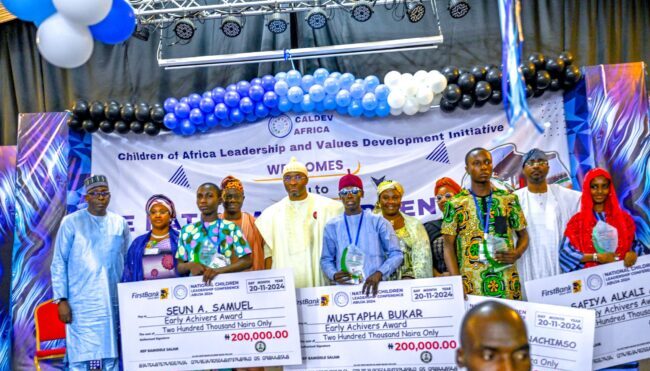Deputy Speaker of the House of Representatives, Hon. Benjamin Kalu, has promised to transmit the resolutions passed by Members of the Children’s Parliament to President Bola Tinubu for implementation.
Hon. Kalu gave the assurance in Abuja during the Early Achievers’ Awards/Dinner organised by the Children of African Leadership and Values Development Initiative (CALDEV), founded by Hon. Bamidele Salam.
The Deputy Speaker, who expressed excitement over the life-impacting initiative envisioned by Hon. Salam, said, “I am impressed with what I am seeing tonight, and I want to assure you that on the motion that you raised and presented to me, the Speaker of the House of Representatives, the Senate President, as well as Mr President, will hear your motion. You raised a topical, very important issue, and Nigeria is going to hear you.”
Hon. Kalu, who argued that children are not only the leaders of tomorrow but influencers of today, emphasised that the destiny of the country lies in their hands.
He said, “Today, we gather here because children are the symbol of hope for Nigeria. Your energy, dreams, and potential are the foundation on which our nation’s progress rests. You are not just the leaders of tomorrow—you are the influencers of today, shaping conversations, challenging norms, and standing as beacons of possibility.
“As I look into this room, I see more than faces; I see dreamers, doers, and decision-makers. But leadership, dear young ones, is not just about standing out—it’s about standing for what is right, even when it is difficult. It’s about having the bravery to speak up for truth, fairness, and justice. Leadership is not about leading alone; it’s about working with others, building teams, and finding strength in unity.
“Nigeria’s destiny lies in the hands of young leaders like you. You have the power to transform our country, to heal divisions, and to inspire unity. You are not just the hope of our future—you are the architects of it.
“Let the lessons you’ve learnt here guide you. Let your passion drive you. And let your actions remind us all that the future of Nigeria is bright because it rests in capable, compassionate, and courageous hands.”
According to the resolutions passed by the CALDEV African Children Parliament, the lawmakers during the mock plenary session harped on the urgent need for the Nigerian government to reinvest savings from the removal of petroleum subsidy into the education, health, and welfare of children for sustainable development.
Majority Leader of the CALDEV African Children Parliament, Hon. Ukpong Hassan, acknowledged that the removal of the petroleum subsidy was a necessary step to reduce fiscal pressure on the nation’s economy that resulted in the government expending over 95% of Nigerian revenue on debt servicing due to the rising debt burden.
He also noted that the Nigerian government under the petroleum subsidy regime was paying subsidy in excess of N10 trillion annually, which affected the government’s ability to channel resources to enhance the sustainable development of the children.
The lawmakers who acknowledged the significant savings being realised from the removal of the petroleum subsidy argued that the savings made from the policy present a unique opportunity for strategic reinvestment to enhance the social development and economic welfare of children and Nigerians.
“The Parliament is conscious that Nigeria’s educational and health sectors are in urgent need of substantial improvements in infrastructure, human resources, and funding to address gaps in service delivery, enhance quality, and provide equitable access to all citizens.
“The Parliament is concerned about the over 58 million vulnerable Nigerian children, who continue to face challenges including malnutrition, food insecurity, lack of access to quality healthcare and education, insurgency, child labour, and other welfare issues.”
The Children Parliamentarians expressed optimism that reinvesting the subsidy savings into sectors that directly affect education, health, and the well-being of children will significantly contribute to achieving long-term social and economic development goals that would address issues of extreme poverty, hunger, the menace of out-of-school children, and infant mortality.
To this end, the lawmakers tasked the Federal Government to earmark and channel a substantial percentage of the savings accrued from the removal of the petroleum subsidy into improving and expanding access to quality education at all levels, with a focus on infrastructure development, capacity building, and recruitment of qualified educators in the 2025 Budget.
They also advocated “a defined proportion of 50% of the subsidy savings for the rehabilitation and enhancement of the nation’s healthcare sector, with a special focus on maternal and child health services, reducing mortality rates, and providing affordable and accessible healthcare services for the most vulnerable.”
In the same vein, the lawmakers called for the establishment of dedicated welfare programs aimed at addressing the nutritional, psychological, and social needs of Nigerian children, using part of the savings to fund school feeding initiatives, promotion of child rights, and child protection services.
They also urged relevant ministries, departments, and agencies of government to put in place a transparent framework to track and publicly disclose the expenditure of these savings in accordance with set targets and measurable outcomes, thereby ensuring accountability and trust among the citizens, particularly children.
The Parliamentarians also harped on the need for synergy with civil society organisations, international development partners, and local stakeholders to maximise the impact of the funds and ensure sustainable and inclusive development outcomes that benefit all segments of the Nigerian population, especially the youth, children, and marginalised groups.
To this end, they urged the Federal and State governments to urgently ensure that functional Children’s Parliaments are established at all levels of government and that the Federal Government and United Nations should adopt the CALDEV Africa National Children’s Leadership Conference as a model policy innovation program for children’s leadership development.
READ MORE FROM: NIGERIAN TRIBUNE
Get real-time news updates from Tribune Online! Follow us on WhatsApp for breaking news, exclusive stories and interviews, and much more.
Join our WhatsApp Channel now
